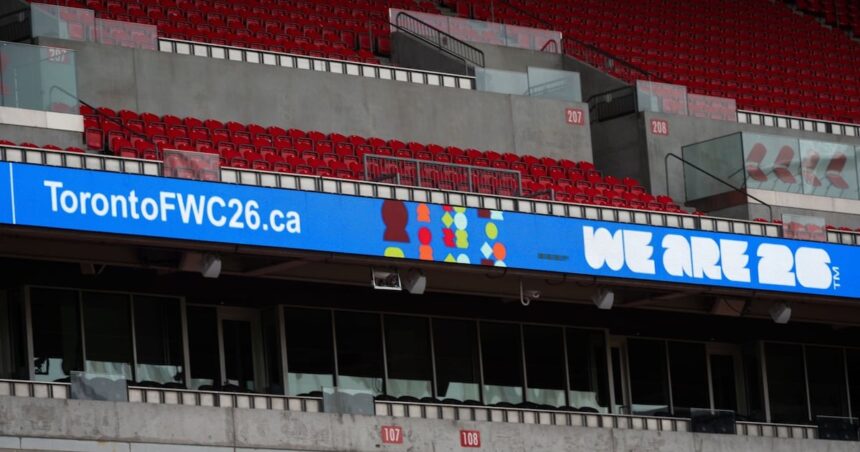In a noticeable shift from his previous stance, Premier Doug Ford signalled yesterday he might be willing to help Toronto shoulder the mounting costs of hosting FIFA World Cup matches in 2026. The potential collaboration comes as city officials warn that expenses could reach $380 million, far exceeding initial projections.
“We’re going to work with the city,” Ford told reporters following an unrelated press conference at Queen’s Park. “This is going to be one of the greatest sporting events in the world, and Ontario needs to put our best foot forward.”
The premier’s comments mark a significant departure from the provincial government’s position earlier this year when Ford declared Toronto would need to manage World Cup expenses within its existing budget. According to sources at City Hall, Mayor Olivia Chow has been lobbying provincial officials for months, emphasizing the economic benefits the tournament could bring to the entire Golden Horseshoe region.
For Torontonians watching this political football match from the sidelines, the timing couldn’t be more critical. The city is already struggling with a structural deficit of nearly $1.5 billion and has limited tools to raise revenue compared to the province.
“Cities simply don’t have the fiscal capacity to host international events of this magnitude without provincial support,” said Enid Slack, director of the Institute on Municipal Finance and Governance at the University of Toronto. “The economic benefits will flow well beyond Toronto’s borders.”
The FIFA tournament is expected to bring an estimated $307 million in tourism revenue to the Greater Toronto Area, according to a report prepared by Ernst & Young for the city. However, security costs alone could top $100 million, with infrastructure improvements and operational expenses making up the remainder of the projected $380 million price tag.
During a community meeting in North York last week, I spoke with small business owners who expressed mixed feelings about the tournament. Maria Constanza, who runs a family restaurant near BMO Field, hopes the international spotlight will boost her business but worries about construction disruptions.
“We survived COVID, barely,” she told me while showing renovation plans for her patio. “The World Cup could be amazing for us, but we need support during the lead-up. We can’t afford another setback.”
The province’s change of heart may also reflect growing public pressure. A recent Mainstreet Research poll found that 64% of Ontarians believe the province should contribute to World Cup expenses, with support highest among younger voters and those living in the 905 region surrounding Toronto.
Ford’s pivot comes just days after federal Sport Minister Carla Qualtrough confirmed Ottawa will provide funding for security operations, though the exact amount remains unclear. With Toronto set to host five to seven matches at an expanded BMO Field, coordination between all three levels of government has become increasingly urgent.
City councillor Josh Matlow, who has been critical of what he calls “blank cheque hosting agreements,” expressed cautious optimism about Ford’s comments. “If the premier is serious about partnering with Toronto, that’s welcome news,” Matlow said by phone. “But we need firm commitments, not vague assurances.”
For Ford, who faces re-election in 2026 – the same year as the tournament – the political calculus is complicated. His government has frequently clashed with Toronto over funding priorities, but the global visibility of the World Cup presents both risk and opportunity.
“No politician wants to be remembered for fumbling a once-in-a-generation sporting event,” noted Nelson Wiseman, professor emeritus of political science at the University of Toronto. “The question isn’t whether Ford will help, but how much and with what conditions attached.”
Those conditions could be substantial. Sources within the premier’s office, speaking on background, suggest any provincial support might be tied to specific infrastructure projects with benefits beyond the tournament itself, possibly including transportation improvements connecting the airport to downtown.
Meanwhile, FIFA’s exacting standards remain non-negotiable. The international soccer governing body requires significant stadium upgrades, dedicated transportation lanes, and extensive security measures that will transform parts of the city during the tournament.
At Timothy’s Coffee Shop near Union Station, I listened as commuters debated the World Cup’s value over morning coffee. “I remember the economic hangover after the Pan Am Games,” said Michael Leung, an accountant heading to work. “But the World Cup is different – it’s truly global.”
Three seats away, Priya Sharma nodded in agreement while scrolling through her phone. “My cousins from England already talk about visiting for the matches. That’s tourist dollars we wouldn’t otherwise get.”
As negotiations continue behind closed doors, the clock is ticking. FIFA’s technical teams will visit Toronto later this year to assess preparations, and delays could jeopardize the city’s hosting status.
For now, Ford’s willingness to discuss funding represents a potential breakthrough, though city officials remain guarded. “We’ve heard promises before,” said a senior city staffer not authorized to speak publicly. “We need commitments in writing, with dollar figures attached.”
Whatever the outcome, Toronto’s World Cup journey highlights the complex relationship between our municipal, provincial and federal governments when it comes to funding major events. The real winners – beyond the teams on the field – might be determined not by goals scored, but by agreements signed in the months ahead.






